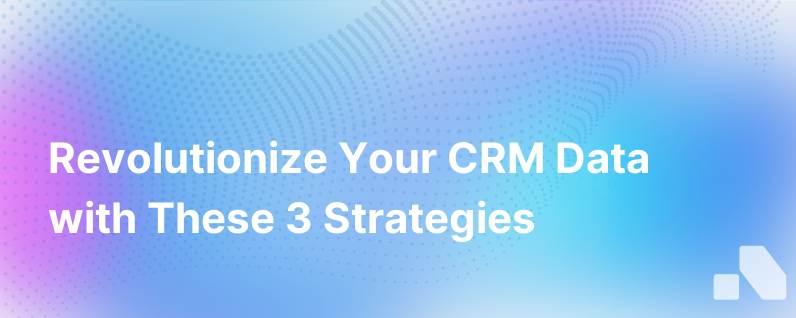
In the fast-paced world of customer relationship management (CRM), data is the lifeblood that powers your sales and marketing strategies. But with the advent of new technologies and methodologies, the quality of CRM data has reached new heights.
Here, we’ll examine three revolutionary ways your CRM data just got better, enabling you to accelerate growth, engage customers more effectively, and refine your operations for peak performance.
1. Enhanced Data Enrichment and Integration
Cloud-Based Integrations and APIs
The advancement of cloud-based technologies has made a world of difference in data enrichment. Modern CRMs can integrate with various external applications and services through APIs, providing a more holistic view of each customer. Sales teams no longer need to switch between platforms; customer information from social media interactions, for example, can be automatically synced with CRM records.
Real-Time Data Enrichment
Real-time data enrichment services ensure that your CRM is not just a static database but a dynamic resource. These services pull data from different sources to keep your contact and account records up-to-date. This means that any changes in a customer's job title or company, or the emergence of new market trends, are captured and reflected instantaneously.
Advanced Data Cleaning
Data cleaning is no longer a tedious manual process, thanks to AI-powered tools that can spot and rectify inconsistencies without human intervention. This not only saves time but also enhances data accuracy, ensuring that your CRM’s insights and analysis are based on the cleanest data possible.
2. Predictive Analytics and AI
AI-Driven Insights
Artificial intelligence (AI) has brought predictive analytics to the forefront of CRM data analysis. AI algorithms can sift through vast amounts of data to detect patterns and predict customer behavior. This level of insight allows for more strategic marketing campaigns, better forecasting, and improved sales strategies.
Personalized Customer Experiences
With AI, your CRM can help you deliver personalized experiences to customers more easily. Machine learning models can recommend products or services to customers based on their past behavior and preferences, which is recorded in the CRM. This intelligence can drive upselling and cross-selling in ways that are both natural and highly effective.
Enhanced Lead Scoring
Lead scoring, a method of prioritizing leads based on their likelihood to convert, has been transformed with AI. Traditional lead scoring might use a simplistic point system that fails to capture the nuanced behaviors of leads; AI-empowered CRMs, however, analyze leads in depth, considering a multitude of behavioral data points to assign a more accurate score.
3. Improved User Experience and Accessibility
Mobile Accessibility
The rise of mobile CRM applications means that sales representatives on the move can access data anytime, anywhere. This isn't just a matter of convenience; it ensures that data is entered and updated at the point of contact, improving its accuracy and timeliness.
User-Friendly Interfaces
CRMs have evolved to become more intuitive, boasting user interfaces designed for accessibility. The less time users spend navigating complicated dashboards, the more time they spend on meaningful customer interactions and data analysis.
Customization and Configurability
Finally, modern CRM systems offer degrees of customization that were previously unavailable. Sales teams can tailor their CRM experience to match their specific workflows, ensuring that the data they see is relevant to their needs and easy to interpret.
Moreover, sophisticated CRMs allow for an agile response to changing market conditions. Teams can tweak their configurations to reflect new sales approaches or strategies, ensuring that the CRM evolves in tandem with the business.
Leveraging Enhanced CRM Data for Competitive Advantage
To make the most of these CRM advancements, businesses need to have strategies and practices in place that align with the capabilities of their CRM system.
-
Data-Driven Decision Making: Leverage the enriched and accurate data for making strategic decisions across the organization. Encourage teams to base their strategies on insights derived from the CRM's predictive analytics.
-
Continuous Data Maintenance: Regularly maintain the CRM data to ensure its quality and relevance. Use data enrichment and AI-driven data cleaning to prevent data decay.
-
Training and User Adoption: Educate sales and marketing teams on the benefits of these enhancements. Promote user adoption by showcasing the ease with which insights can be derived from the CRM data.
-
Balancing Automation and Personalization: Use AI to automate mundane tasks while maintaining a personal touch in customer interactions. With better lead scoring and personalization, teams can craft messages that resonate with each customer.
-
Customization for Agility: Utilize the CRM's configurability to quickly adjust to new business processes or market demands. Custom dashboards can help in monitoring KPIs that are most relevant at any given time.
Conclusion
The world of CRM data has made a quantum leap forward. With enhanced data enrichment and integration, predictive analytics empowered by AI, and improved user experiences, CRMs are opening up avenues to a smarter and more effective approach to customer management.
By embracing these advances, businesses not only streamline their operations but also create deeper, more insightful relationships with their customers. The better your CRM data, the better you're positioned in a competitive market to respond to customer needs, anticipate changes, and drive growth.
It's a transformative time for CRM systems and the businesses that leverage them—a veritable renaissance in managing customer relationships.